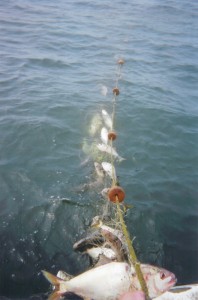
At the end of John’s Gospel Peter gets impatient waiting for the resurrected Messiah to show up with further instructions and goes fishing with the other Apostles. They catch nothing all night. In the morning they see Jesus on the beach grilling fish (where’d He get those?) He tells them to cast the net on the other side of the boat. They end up with over a hundred and fifty big fish. He tells them to drag them to the shore. He feeds them with His fish while the ones they caught with the Lord’s help are still flopping in the net next to them. He then repeatedly asks Peter if He loves Him “more than these.”
These what? — That’s a question that has perplexed theologians and Bible scholars for all these centuries. But I know the answer — “Do you love me more than these fish?” It’s a funny picture — cuts right to the heart of the matter.
I was just playing Judy Collins’ “The Fishermen’s Song” on my guitar. My son Michael, who plays much better than I do, first strummed an acoustic to this song as a little white haired mischief maker while I sang and fingered the chords (“Our fishermen’s not greedy; they seem to take to live with the sun and the sand and a net full of fishes when the tide turns” — great lyric).
“Simon Peter climbed aboard and dragged the net ashore. It was full of large fish, 153, but even with so many the net was not torn.” John 21:11.
Regardless the symbolism we are told to take from the specific number of fish and that the net was still intact, the obvious implication to these hardworking men of meager means was this: if they just follow the Lord’s lead for the rest of their lives, they are sure to be very successful at their chosen professions. The “prosperity Gospel” was off to a very propitious beginning, it would seem.
But I just realized that he was asking Peter if he loved Him more than the earthly riches he could get out of Him. It’s the classic Father/son crisis moment — reiterated in the parable of the Prodigal Son.
According to tradition all the Apostles proved their love for their Eternal Father in that they chose faith in Him above liberty, the pursuit of property and worldly happiness and even life itself, each separately choosing to be killed rather than to renounce belief in the resurrected Lord Jesus Christ.
And, as far as we know, Peter and the other fishermen Apostles never went fishing again — at least for fish.

{ 4 comments… read them below or add one }
Hi Chuck,
I like your exegesis on my own favorite Gospel chapter. It describes the Servant of all serving again humbly, lovingly preparing food over an open fire on a beautiful shore for His hungry, discouraged friends.. Perhaps that is how one gets to be the greatest of all. More importantly for us, it suggests that putting God first in our lives allows God to take care of the rest for us just as a parent provides for a child. Anyway, your web site looks good. It only lacks a little suffering to spice it up.
Grandpa
Thanks, Frank.
The fish don’t look too happy ….
Dear Chuck,
Great insight into this Gospel passage. Trust in God and not the ways of this world!!!! It must have been difficult to do that after such a great catch!!!!
Peace,
John Mc
Thanks for the kind words, John.
This instance reminds me of after the miraculous feeding of the 5000. The masses would have followed Him to the ends of the earth as long as He kept that coming. But when He mentioned that they would have to eat His flesh and drink His blood (John 6:53) — that was a seahorse of a different color. There was the intimation of great sacrifice and suffering in that statement.
The Apostles stayed and went on to not only feed upon the Lord for the rest of their earthly lives, but became quite literally human sacrifices for the Gospel themselves .